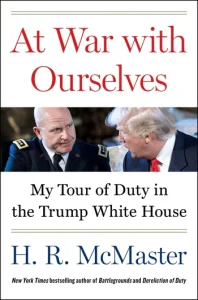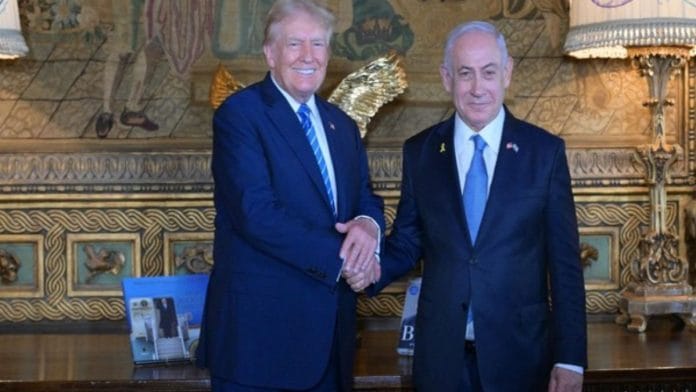Reporters and former officials with experience in the Middle East described Trump’s desire to broker the “deal of the century” between Israel and the Palestinians as naïve. But I thought that a touch of naïveté might be necessary to make progress on one of the longest-running and most complex conflicts in the world. When, nearly three weeks earlier, on May 3, Trump hosted the president of the Palestinian Authority, Mahmoud Abbas, at the White House, he had caused consternation across the Arab world and in Europe and among factions in Israel with the statement “I’m looking at two-state and one-state, and I like the one that both parties like . . . I can live with either one.”
In the meeting with Abbas and his party in the Cabinet Room, Trump had used language consistent with a two-state solution, but he was very direct about the need for the Palestinian Authority to reform and to contest the grip that the terrorist groups Hamas and Palestinian Islamic Jihad had on Gaza and the inroads they were making into the West Bank. Trump had also begun to put pressure on Netanyahu by saying to many audiences that he did “not think Bibi wants to make a deal.” He was not wrong. Netanyahu and other Israeli leaders had legitimate concerns that a two-state solution would be unviable.
The horrific Hamas terrorist attacks on Israel over six years later, on October 7, 2023, revealed that the viability of a two-state solution depended on ensuring that terrorists cannot control territory on Israel’s borders. The main obstacles to enduring peace had not changed: Did Palestinians have the right to return to land lost since 1948? Should Israeli settlements in the West Bank be dismantled? What is the future of East and West Jerusalem? It remained difficult to imagine answers to those questions that both sides would find acceptable. The morning after the visit to the Western Wall, I met Stephen Miller on my way to see Trump before we departed for another busy day. I had already worked with Miller to add language to the president’s forthcoming speeches at the Palestinian Authority in Bethlehem and at the Israel Museum: the added text would concern a horrible terrorist attack at England’s Manchester Arena that had killed twenty-two and injured more than a thousand innocent concertgoers.
Miller told me that the president had modified the language slightly, adding his description of terrorists as “losers.” The president had also, Miller said, made additions to a speech he would give later in the day, at Yad Vashem, Israel’s Holocaust memorial museum, to announce that he had decided to move the U.S. embassy from Tel Aviv to Jerusalem. Finally, Miller informed me the president had seen a film last night at dinner that portrayed Palestinian leaders encouraging terrorist acts against Israelis and rewarding the murder of innocents.
I thanked Miller for filling me in and went to see the president. As I walked into his room, Trump asked me, “Do you like calling the terrorists ‘losers’?” I responded, “I like it. It is an accurate description for people who murder innocents.” Trump then told me about the film Netanyahu had shown him. I surmised from his description that it had spliced together footage of Abbas to make it appear that he had called for the murder of Israeli children. I told Trump that Miller had mentioned that he might now announce the move of the U.S. embassy to Jerusalem.
I asked him to reconsider that decision so he could hear from his cabinet first and to give us time to develop a plan to maximize the advantages of such a move and mitigate any negative consequences. He agreed. “Okay, General, you can take it out of the speeches.” The motorcade moved quickly along the cleared roads for the short drive into the West Bank and on to Bethlehem. I rode with Trump. Policemen lined the entire route at intervals of between twenty and fifty yards. Trump stewed about the film from the night before. I assumed that Netanyahu had shown the film not just to undermine Trump’s relationship with Mahmoud Abbas, but also to prevent the president from pushing harder for a moratorium on new Israeli West Bank settlements or for a two-state solution unacceptable to the Netanyahu government. In Bethlehem, Mahmoud Abbas waited for Trump at the Mukataa, the seat of Palestinian government, at the end of a red carpet with two children in biblical-era dress bearing flowers.
A band and honor guard stood at attention as Abbas and Trump walked up the red carpet together. Anthems played. Trump and Abbas reviewed the troops. They walked into the Mukataa, to a receiving line of Muslim, Orthodox, and Catholic clerics. The rest of us went in through a side door, entered a square room, and sat in chairs across from the Palestinian delegation. I leaned over to Kushner and said, “I hope this meeting doesn’t blow up. It sounds like Netanyahu ran an operation on the president of the United States last night.” From the outset of the meeting, it was clear the film screening had the desired effect. Trump had a compassionate side, and any abuse or harm to children incensed him. I had seen that side of him when he learned of the murder of children in Syria. His anger boiled over. Now he accused Abbas and others in the room of murder. His tone and his words were threatening.
Members of Abbas’s party, most of whom had attended the congenial meeting in the White House just two and a half weeks earlier, wore expressions of befuddlement and panic. Tillerson, who was sitting to my left, stared at the floor. The worst was over. The bilateral meeting broke up, and a stunned Abbas walked with Trump across the courtyard to where both would make short statements. Trump, returning to the terrorist attack at the Manchester Arena, offered his condolences to the families of the fallen, calling the terrorists “evil losers” who must be “driven out from our society forever.” On the prospects for enduring peace between Israel and the Palestinians, he stated his desire to do “everything I can . . . to achieve a peace agreement between the Israelis and Palestinians.” Abbas also described the Manchester Arena murders as a “horrible terrorist attack.”
 This excerpt from HR McMaster’s ‘At War With Ourselves: My Tour of Duty in The Trump White House’has been published with permission from HarperCollins.
This excerpt from HR McMaster’s ‘At War With Ourselves: My Tour of Duty in The Trump White House’has been published with permission from HarperCollins.






